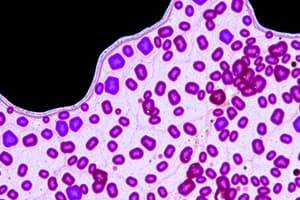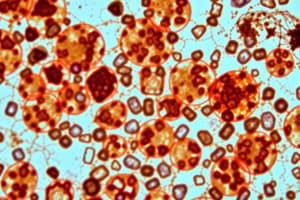Podcast
Questions and Answers
What is the term for the strength of the binding between an antibody and its specific antigenic epitope?
What is the term for the strength of the binding between an antibody and its specific antigenic epitope?
- Affinity (correct)
- Antibody specificity
- Avidity
- Antibody sensitivity
What is the term for the strength of multiple interactions between a multivalent antigen and antibody?
What is the term for the strength of multiple interactions between a multivalent antigen and antibody?
- Avidity (correct)
- Antibody sensitivity
- Affinity
- Antibody specificity
What is the characteristic of an antibody that enables it to bind selectively to a single epitope on an antigen?
What is the characteristic of an antibody that enables it to bind selectively to a single epitope on an antigen?
- Antibody specificity (correct)
- Affinity
- Avidity
- Antibody sensitivity
What is the term for the relative amount of antigen that an immunohistochemical technique is able to detect?
What is the term for the relative amount of antigen that an immunohistochemical technique is able to detect?
What is the term for the regions of an IgG molecule that vary in amino acid sequence?
What is the term for the regions of an IgG molecule that vary in amino acid sequence?
What is an epitope composed of?
What is an epitope composed of?
Which of the following is NOT a function of antibodies?
Which of the following is NOT a function of antibodies?
What is the most commonly used antibody for immunohistochemistry?
What is the most commonly used antibody for immunohistochemistry?
What is the cellular origin of antibodies?
What is the cellular origin of antibodies?
Flashcards are hidden until you start studying
Study Notes
Antigen and Epitope
- Antigen: a molecule that induces an immune response and has one or more antibody binding sites
- Antigens can be found in bacteria, viruses, and tumors
- Epitope: a specific topographical region composed of a small number of amino acids or monosaccharide units
Antibodies
- Serum proteins known as immunoglobulins, found in blood and tissue fluids, as well as many secretions
- Antibodies can be monomeric, dimeric, trimeric, tetrameric, or pentameric
- Monomer composed of two heavy and two light chains
- Cleaved with enzymes such as papain and pepsin, producing two Fab (fragment antigen-binding) and Fc (fragment crystallizable)
- Formed in the humoral immune system by plasma cells, the end cell of B-lymphocyte transformation after recognition of a foreign antigen
Types of Antibodies
- IgA, IgD, IgE, IgG, and IgM
- IgG is the most common and frequently used antibody for immunohistochemistry
- IgG molecule composed of two pairs of light and heavy polypeptide chains linked by disulfide bonds, forming a Y-shaped structure
- Terminal regions of each arm vary in amino acid sequence and are known as ‘variable domains’
Affinity and Avidity
- Affinity: the three-dimensional fit of the antibody to its specific antigen, measuring the binding strength between the antigenic epitope and its specific antibody-combining site
- Avidity: a related property referring to the heterogeneity of the antiserum, containing various antibodies reacting with different epitopes of the antigen molecule
- Avidity is the strength of multiple interactions between a multivalent antigen and antibody
Antibody Specificity and Sensitivity
- Antibody specificity: the characteristic of an antibody to bind selectively to a single epitope on an antigen
- Antibody sensitivity: the relative amount of antigen that an immunohistochemical technique is able to detect
Studying That Suits You
Use AI to generate personalized quizzes and flashcards to suit your learning preferences.




